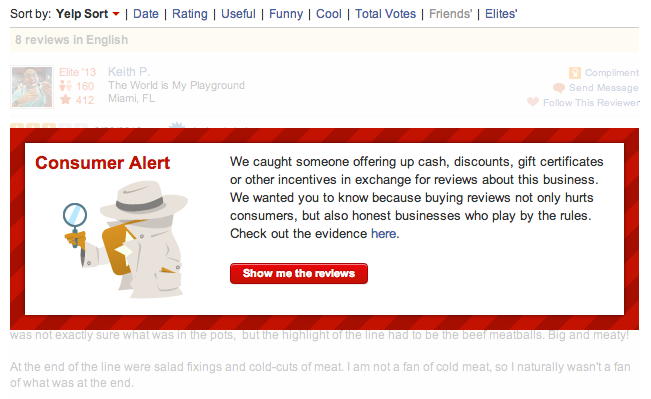“Best Cheesecake in Cincinnati! My husband and I stepped into Cassandra’s Cake Corner and were quickly seated. I ordered the Espresso Double-Blonde Chocolate Cheesecake with a Cassie’s Cinnamon Latte and I was impressed! Bold flavors, creamy chocolate…I was in heaven! I will go here again!”
Fake online reviews, like the one above, are a thorn in the side of business owners everywhere. Heavy on the exclamation marks and dripping with precise menu titles (something a normal reviewer probably wouldn’t mention), glowing reviews like this one on Yelp or Google Reviews are unfair to businesses playing by the rules.
So, it’s tempting to cheat, right? You know, have your mom and best friend post a few reviews under a few fake accounts? What could it possibly hurt?
In a word: no. We know it’s tempting to log in and start word-slinging, left and right, that your massage practice is relaxing! That your car wash is the BEST! That your haircuts are trendy! But breaking the rules just isn’t worth it.
After all, Yelp filters out about 25 percent of questionable reviews using their algorithm that searches for patterns of speech, use of pronouns and other red flags that denote a false review. A recent Harvard Business School study found that in many cases, fake reviews (positive or negative) are submitted by businesses with a tarnished or struggling online reputation.
Buying positive reviews is another area of caution. If you’re caught in one of Yelp’s “stings,” then your business could be slapped with a shame banner:

Posting a fake negative review for another business is similarly banned by Yelp. Most people think that negative reviews are written by competitors who want to turn away potential customers from their arch rivals. Interestingly, a new study by researchers at Northwestern University and M.I.T. Sloan School of Management found that fake reviews are most often posted by ardent customers who never purchased the item they are complaining about in the first place.
The study concluded that these fake negative reviews were a form of “venting.” In other words, the customers had an ax to grind and a reviews forum was seen as a good place to be heard.
To achieve great online reviews, remember the number one rule of small business owners everywhere: ask for them. We don’t recommend offering a small bribe to do so (and it’s against Yelp’s terms and conditions anyway). But asking your happy customers to hop over to Yelp and Google Reviews is completely legit.
Our final word of advice: aim for truly amazing customer service. When you do that, you open up a whole new five-star world for your business. There’s no faking a satisfied customer.

